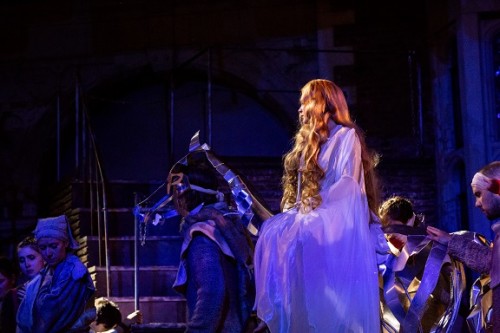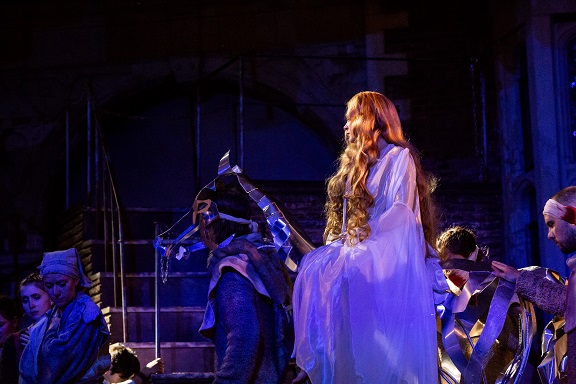
 United Kingdom Mascagni, Isabeau (UK premiere): Soloists. Chorus of Opera Holland Park, City of London Sinfonia / Francesco Cilluffo (conductor). Opera Holland Park, Kensington, London, 14.7.2018. (CC)
United Kingdom Mascagni, Isabeau (UK premiere): Soloists. Chorus of Opera Holland Park, City of London Sinfonia / Francesco Cilluffo (conductor). Opera Holland Park, Kensington, London, 14.7.2018. (CC)

Cast:
Isabeau – Anne Sophie Duprels
Folco – David Butt Philip
King Raimondo – Mikhail Svetlov
Cornelius – George von Bergen
Ermyntrude – Nadine Benjamin
Giglietta – Fiona Kimm
Il cavalier Faidit – Oliver Brignall
L’araldo maggiore – Thomas Humphreys
Production:
Director – Martin Lloyd-Evans
Designer – takis
Lighting designer – Robbie Butler
How wonderful to be able to explore these obscure corners of the operatic repertoire. One even dares to ask whether maybe Mascagni’s time is coming? Opera Holland Park has already given us a fabulous Iris (review) – a production that also featured soprano Anne Sophie Duprels as the titular heroine – and now we have Isabeau in a co-production with New York City Opera. Wexford Opera presented Guglielmo Ratcliff (maybe something for OHP?) in 2015 conducted by Francesco Cilluffo and starring Angelo Villari in the title role.
Premiered in Buenes Aires in 1911 at the Teatro Coliseo and published by Casa Musicale Sanzogno, Milan, Isabeau retells the Lady Godiva story, King Raimondo forcing his daughter, Isabeau, to ride around the city naked, after she rejects a string of five suitors, and insisting no-one looks upon her. Sadly, Falco does, for which his reward is imprisonment and, finally, death (at which point Isabeau joins him in death). The librettist is none other than Luigi Illica, a familiar name to many operagoers but perhaps a surprise here. Sadly, Isabeau has effectively disappeared from any sort of hold in the repertoire whatsoever and while it its true that the opera is not on the level of Cavalleria rusticana, it is a fine, strong score, beautifully scored. The only problem really is the memorability of the lines, so strong when we hear them, and yet lost not too long afterwards. Mascagni’s harmonic language is less overtly Italianate than in Cav, and there is a distinct impression of him trying to achieve a seamless flow. The melodies are engaging, though, especially when given by the orchestra, spurred on to fervent form on this occasion by the excellent Francesco Cilluffo. The extended orchestral Intermezzo (apparently called ‘Hymn to the Sun’ by Mascagni) was a triumph, and while it seems to be a truism that the City of London Sinfonia is getting better year on year, this was exceptional.
A note on names. Folco lives up to his name: he is a falconer. When we hear mention in the text of ‘Ubaldo of Edinburgh’ and ‘Ethelberto of Argyle,’ though, it is difficult not to titter. There’s also a pre-Magic Roundabout ‘Ermyntrude’ (older spelling, as one might justly expect). But we have to remember we are in a doubly-constructed mediaeval world; firstly by Mascagni (not that he attempts to reconstruct medieval music in his writing) and secondly by the director, Martin Lloyd-Evans. So, in this production we see several structures that give us perspectives on various buildings, plus a drum tower (a semicircular wall) that should slide smoothly away to reveal the King. Sadly, for what seemed like ages, no matter how hard the gentleman clad in medieval clothes pushed, it would not go. One hopes fervently this is fixed before long; it is a brave thing to have characters and chorus members acting as stage hands, as they are repeatedly called to do. That unfortunate incident aside, the actual staging is clever, utilizing what is available at Holland Park. Falco’s falcon is depicted at various points as a metallic bird that has to be carried around. The use of six on-stage trumpeters at the opera’s opening, with Thomas Humphreys as a lusty herald, was mightily effective as the proclamation of a joust. If you’re interested, Duprels wears a body stocking for the naked bits.
Perhaps the greatest surprise was that there were three vocal stars on the night. Duprels’ soprano is a beautiful instrument and she can convey both fragility and ardency – and did. It is quite fitting that she should be the first-listed, her voice shining brightly; but tenor David Butt Philip was truly exceptional as Folco, a truly heroic aspect to his voice married to exemplary musicality. This despite the fact that the lines lie so cruelly and insistently high. The bass Mikhail Svetlov had previously impressed as Díkoj in OHP’s Kabanovà, Montemezzi’s L’Amore di tre Re and as Cieco in Iris. (He was also the Police Inspector in Covent Garden’s Lady Macbeth earlier this year.) He was on his finest, most commanding form here, even finer in both presence and vocal heft than any of the above. A special mention to both of Isabeau’s maids, Ermyntrude (the fabulous British soprano Nadine Benjamin, who on the strength of the beauty of her voice this evening has a fine career ahead) and Ermyngarde, Joanna Marie Skillett. The passages where Mascagni entwined the two maids’ voices accompanied by harp at the opening of the third act were transformed to sonic magic by this pair. George van Bergen was a strong Cornelius and it also looked like Fiona Kimm had a great time evoking Isabeau’s ancient grandmother, Giglietta.
The Chorus of Opera Holland Park shines regularly in verismo repertoire, and it shone again here. Isabeau could not realistically ask for greater vocal support than here. If Cilluffo occasionally has the odd corner of bad ensemble, that, like the scenery, will surely be mended as the run continues. Fabulous.
Colin Clarke
For about what is one at Opera Holland Park click here.
